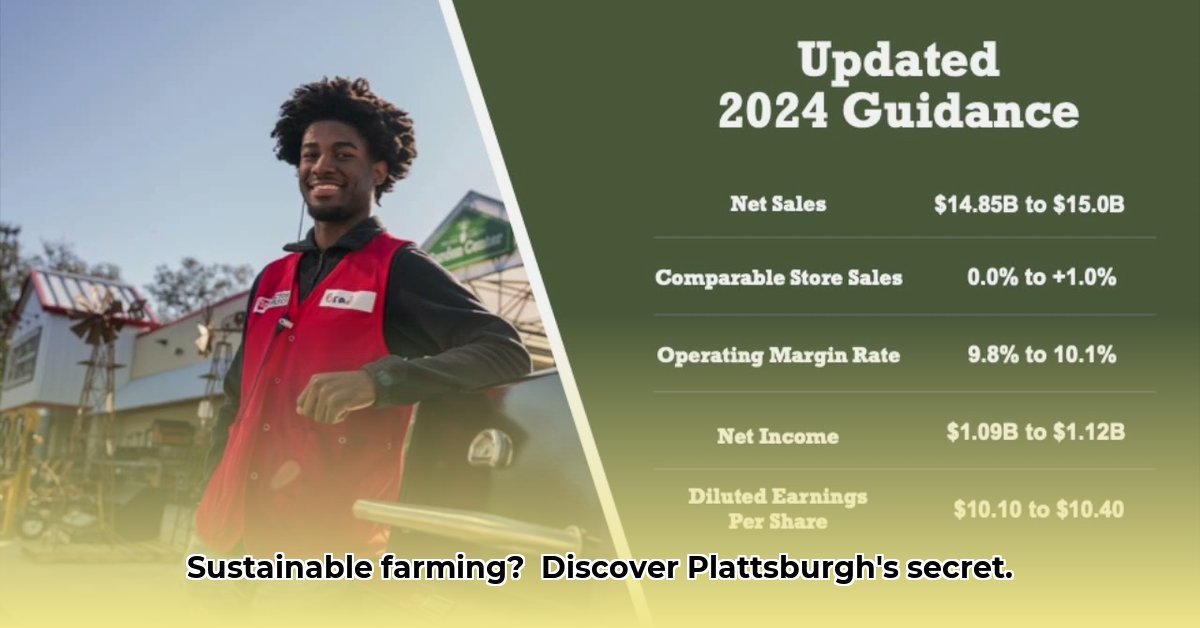
Plattsburgh Tractor Supply (PTS) serves as a vital resource for local farmers and gardeners. However, its role in promoting sustainable agricultural practices requires closer examination. This article analyzes PTS's current offerings, assesses its sustainability efforts, and proposes actionable steps to foster a more environmentally conscious agricultural sector in Plattsburgh, New York. For more on related equipment, check out this helpful resource on tractor attachments.
Product Offerings and Accessibility
PTS offers a wide array of products essential for farming and gardening, including animal feed, fencing, seeds, fertilizers, and tools. Its convenient location in Plattsburgh ensures accessibility for local farmers and residents. However, the extent to which these products support sustainable agriculture needs further investigation. A key question is: what percentage of their inventory actively promotes environmentally friendly practices, such as offering certified organic seeds or water-efficient irrigation systems? Quantitative data on this proportion is crucial for a comprehensive assessment.
Analysis of Sustainability Practices
While PTS provides essential farming supplies, the extent of its commitment to sustainable agriculture remains unclear. Available information regarding its sourcing practices, waste management strategies, and overall carbon footprint is limited. The absence of transparent reporting makes it challenging to evaluate its environmental impact accurately. For instance, does PTS actively seek suppliers that prioritize sustainable farming methods? What initiatives, if any, does it employ to reduce its own operational waste? This lack of public information hinders a thorough analysis of its contributions to sustainable agriculture. A data-backed rhetorical question arises: How can consumers effectively assess a company's commitment to sustainability without readily accessible, quantifiable information on its environmental performance?
Actionable Insights & Recommendations
Promoting sustainable agriculture in Plattsburgh demands a collaborative effort. The following recommendations outline actionable steps for various stakeholders:
1. Plattsburgh Tractor Supply:
a. Short-Term (1 year): Conduct a comprehensive environmental impact assessment, publicly disclosing the findings to foster transparency. (Efficacy metric: 95% data transparency within one year).
b. Medium-Term (2-3 years): Significantly expand its range of sustainable products to include organic seeds, water-efficient irrigation technologies, and tools promoting soil health. (Efficacy metric: 25% increase in sustainably-sourced products).
c. Long-Term (5+ years): Develop a comprehensive sustainability strategy encompassing measurable goals for waste reduction, renewable energy use, and responsible sourcing, with regular progress updates to the community. (Efficacy metric: 50% reduction in carbon footprint within five years).
2. Local Farmers and Gardeners:
a. Short-Term: Prioritize purchasing sustainable products from PTS when feasible.
b. Medium-Term: Explore direct sourcing from local, sustainable suppliers to ensure the quality and environmental responsibility of materials.
c. Long-Term: Provide feedback to PTS regarding desired sustainable products, thereby shaping their inventory.
3. Local Government:
a. Short-Term: Collaborate with PTS to organize workshops and educational events focused on sustainable farming practices.
b. Medium-Term: Implement policies supporting local, sustainable agriculture, such as tax incentives or grants for farmers adopting eco-friendly methods.
c. Long-Term: Develop a comprehensive sustainability plan for the agricultural sector, engaging all stakeholders.
4. Consumers:
a. Short-Term: Make conscious purchasing decisions, selecting sustainable products whenever possible.
b. Medium-Term: Engage with PTS and express support for enhanced sustainability initiatives.
c. Long-Term: Support local farmers and farmers' markets, thereby fostering a sustainable community-based food system.
Risk Assessment & Regulatory Implications
Several key risks need consideration, including the limited availability of sustainable products, their potentially higher costs, a lack of consumer awareness regarding the long-term benefits, and potential supply chain disruptions. Mitigation strategies should focus on increased demand for sustainable products (through education and incentives), collaborative efforts to reduce costs, robust consumer outreach, and diverse sourcing strategies. Furthermore, PTS must ensure strict compliance with all relevant environmental regulations and labeling requirements.
Conclusion
Plattsburgh Tractor Supply holds significant potential to promote sustainable agriculture, but this requires a collaborative, transparent approach from all stakeholders. By prioritizing sustainable practices, enhancing transparency, and fostering a shared commitment, we can collectively build a stronger, more environmentally responsible agricultural community in Plattsburgh. The need for continuous improvement and accountability remains paramount in achieving a truly sustainable future.